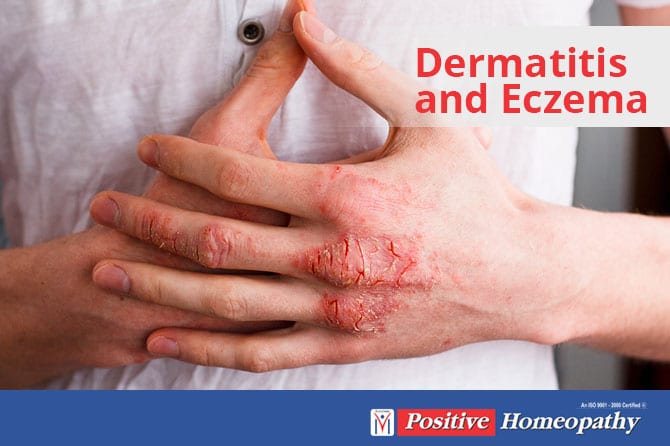Dermatitis and Eczema are being used synonymously by the physicians. Therefore, they are ascertained together..
Dermatitis is a non-contagious skin disease. The skin cells inflammation in Dermatitis is known by the presence of redness of the skin with scaling and swelling. There is vesiculation and oozing of discharge as well.
Dermatitis as such means inflammation of the skin of all kinds except by specific infections.
Eczema on the other hand is an outcome of antigen-antibody reaction which leads to inflammation of the superficial layer of skin , epidermis with vesicle formation.
Causative factors : 1) Allergy 2) Exposure to chemical irritants 3) familial tendency 4) Age of the individual .
More than the causative factors, there are certain triggering factors or agents which are responsible for the eczema and dermatitis.
The triggering factors for eczema are : chemical irritants, exposure to plants, clothing, cosmetics, drugs or medicines, certain diet/food items, etc.
Eczema also develops in people who are suffering from xeroderma or ichthyosis, greasy skin, excessive sweating, varicose veins and chilblains.
The journey of eczema can be classified into three stages. Acute Eczema, Sub-acute Eczema and Chronic Eczema
Acute stage of eczema starts with redness of the skin and itching. It is followed by sub-acute stage with the appearance of swelling and papules . These stages dont last long and the lesions disappear. But if the cause for eczema persists, it lasts over months or years and thus becomes chronic eczema. Finally the skin becomes thickened, pigmented with prominent criss-cross markings.
Different types of Dermatitis and Eczema : Some of the common types of dermatitis and eczema are listed here
- Photodermatitis
- Contact dermatitis
- Infantile eczema
- Atopic dermatitis
- Neurodermatitis
- Seborrhoeic dermatitis
- Discoid eczema
What is status eczematicus ?
When the skin of an Eczema patient becomes sensitive and it reacts unfavourably to the local applications or ointments, it is called “status eczematicus.”
Is eczema curable ?
The acute and subacute stages of eczema do not last long and gets healed. But the chronic stage of eczema requires good homeopathic treatment for complete cure and to stop return of eczema.
How do i prevent eczema?
Eczema can be prevented from long suffering by being alert from triggering factors which lead to eczema bloom such as chemical irritants, certain drugs and medicines, allergens such as plants, animals, clothing and cosmetics.
Is eczema contagious ?
Eczema or dermatitis as such are not contagious. But in some chronic eczematous patients who are vulnerable to infections can become source of spread of infection but not eczema. So as to say, eczema is not contagious because eczema is an outcome of antigen-antibody reaction due from allergy in people with sensitive skin.
At Positive Homeopathy Clinics, the doctors are well experienced to diagnose eczema and dermatitis from other similar skin diseases which is vital in the selection of homeopathic medicines. The doctors then carefully select the most important and also most common features in the patient in relation to the disease symptoms as well as with regards to personality of the patient which is unique from others. Such a method of practising is known as constitutional treatment which is the core of homeopathy responsible for permanent cure in almost all the diseases. It is ensured by the doctors themselves that medicines selected are then dispensed appropriately so that eczema and dermatitis can be cured. All these guidelines are followed in all the Positive Homeopathy Clinics which has earned itself as one of the best homeopathic clinics in the treatment of eczema and dermatitis.

